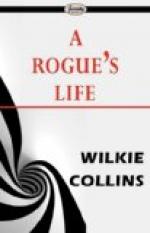How long I stayed is more than I can tell. Lunch came up. I eat and drank, and grew more amusing than ever. When I at last rose to go, the brown eyes looked on me very kindly, and the doctor gave me his card.
“If you don’t mind trusting yourself in the clutches of Doctor Faustus,” he said, with a gay smile, “I shall be delighted to see you if you are ever in the neighborhood of Barkingham.”
I wrung his hand, mentally relinquishing my secretaryship while I thanked him for the invitation. I put out my hand next to his daughter, and the dear friendly girl met the advance with the most charming readiness. She gave me a good, hearty, vigorous, uncompromising shake. O precious right hand! never did I properly appreciate your value until that moment.
Going out with my head in the air, and my senses in the seventh heaven, I jostled an elderly gentleman passing before the garden gate. I turned round to apologize; it was my brother in office, the estimable Treasurer of the Duskydale Institute.
“I have been half over the town looking after you,” he said. “The Managing Committee, on reflection, consider your plan of personally soliciting public attendance at the hall to be compromising the dignity of the Institution, and beg you, therefore, to abandon it.”
“Very well,” said I, “there is no harm done. Thus far, I have only solicited two persons, Doctor and Miss Dulcifer, in that delightful little cottage there.”
“You don’t mean to say you have asked them to come to the ball!”
“To be sure I have. And I am sorry to say they can’t accept the invitation. Why should they not be asked?”
“Because nobody visits them.”
“And why should nobody visit them?”
The Treasurer put his arm confidentially through mine, and walked me on a few steps.
“In the first place,” he said, “Doctor Dulcifer’s name is not down in the Medical List.”
“Some mistake,” I suggested, in my off-hand way. “Or some foreign doctor’s degree not recognized by the prejudiced people in England.”
“In the second place,” continued the Treasurer, “we have found out that he is not visited at Barkingham. Consequently, it would be the height of imprudence to visit him here.”
“Pooh! pooh! All the nonsense of narrow-minded people, because he lives a retired life, and is engaged in finding out chemical secrets which the ignorant public don’t know how to appreciate.”
“The shutters are always up in the front top windows of his house at Barkingham,” said the Treasurer, lowering his voice mysteriously. “I know it from a friend resident near him. The windows themselves are barred. It is currently reported that the top of the house, inside, is shut off by iron doors from the bottom. Workmen are employed there who don’t belong to the neighborhood, who don’t drink at the public houses, who only associate with each other. Unfamiliar smells and noises find their way outside sometimes. Nobody in the house can be got to talk. The doctor, as he calls himself, does not even make an attempt to get into society, does not even try to see company for the sake of his poor unfortunate daughter. What do you think of all that?”




